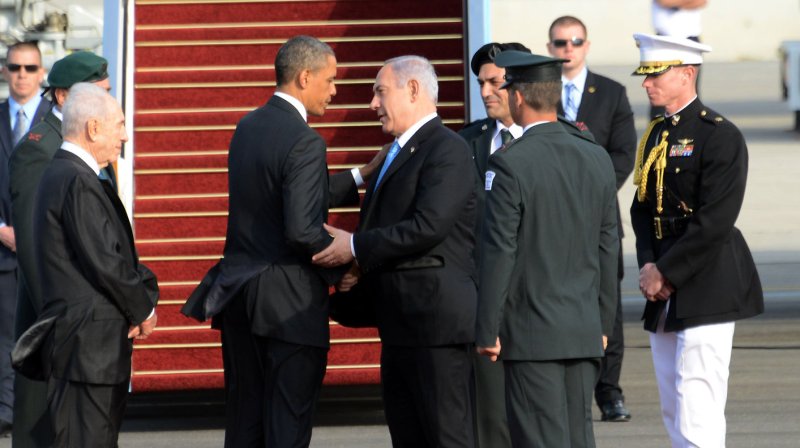U.S. President Barack Obama and Israeli Prime Minister Benjamin Netanyahu say good-bye before Obama boards Air Force One to depart Israel at Ben Gurion Airport near Tel Aviv, March 22, 2013. President Obama wrapped up a three day visit to the Holy Land before flying to Jordan. UPI/Debbie Hill |
License Photo
BEIRUT, Lebanon, March 26 (UPI) -- The apparent rapprochement, brokered by U.S. President Barack Obama, between Middle Eastern military heavyweights Israel and is expected to have a significant strategic effect on the turbulent region.
Most importantly, the moves toward re-establishing the military alliance between the two non-Arab powers will be a major boost for U.S. diplomacy as its regional influence wanes.
It also signals cooperation to contain the Syrian bloodbath that threatens to destabilize the region and to develop vast natural gas fields under the eastern Mediterranean.
But it's likely this will take time. There's "little indication that a breakthrough was imminent," observed the U.S. global security consultancy Stratfor.
Obama's diplomatic coup came in a last-minute huddle with Israeli Prime Minister Binyamin Netanyahu in a trailer on the tarmac at Ben Gurion Airport outside Tel Aviv Friday as Obama prepared to end a three-day visit to Israel, his first since he took office in January 2009.
It had all the trappings of a well-staged diplomatic drama.
The official version is that after convincing the obdurate Netanyahu to take the initiative to break the impasse, Obama telephoned Turkish President Recep Tayyip Erdogan in Ankara and then put Netanyahu on the line.
During the 30-minute call, Netanyahu apologized for the Israeli navy's attack May 31, 2010, on the Turkish vessel Mavi Marmara in international waters in which nine Turks were killed.
The ship was leading a flotilla carrying humanitarian aid for Palestinians in the Hamas-ruled Gaza Strip, blockaded by the Israelis.
Turkey, under Erdogan's Islamist government, and Israel had been at odds since December 2008 over the Israeli invasion of Gaza in an abortive bid to crush Hamas, in which some 1,400 Palestinians, mostly civilians, were killed.
Netanyahu steadfastly refused to apologize for the killings or to pay compensation to the victims' families despite international opprobrium.
Diplomatic relations between the countries, which had been military allies since the 1960s, discreetly so for most of that time, effectively ended.
So did Turkey's access to Israel's high-tech defense industry and Israel's access to Turkish air space -- situated on Iran's western border.
Netanyahu's apology, which Obama had been prodding him to make throughout his visit, may have broken the ice between two key U.S. allies in one a tough part of the world.
But Israeli and Turkish officials insist that normalizing relations will be a gradual process of rebuilding trust, if not affection, on both sides. A senior Turkish official suggested it could be four months before ambassadors are exchanged again.
Israel's economic blockade of Gaza remains in place with no indication it will be lifted anytime soon, as Ankara wants. That could hold things up.
But it should be noted that Friday's Obama surprise followed months of discreet meetings, in Cairo and elsewhere, between senior intelligence officials on both sides to resolve the dispute, with U.S. encouragement.
There remain hard-line factions on both sides that don't favor rapprochement.
But events in the region, most notably the Syrian war, Iran's confrontation with the West and Israel, and the ongoing discovery of major offshore gas fields in Israel and Cyprus, who'll likely be joined by Lebanon in a few years, will undoubtedly dictate a revived Israeli-Turkish alliance.
Both countries have become internationally isolated. Erdogan's efforts to cozy up to Iran and Syria have ended in failure.
Now Erdogan's drive to restore Turkey as the region's paramount power and transform it into the key energy hub is taking precedence.
Israel and Cyprus have talked of jointly exporting their gas to Europe via Greece.
But, as Matthew Bryza, former U.S. ambassador to Azerbaijan, observed, in the long run, a Cypriot pipeline to Turkey would make most commercial sense.
Erdogan has demonstrated his pragmatism by engaging in serious peace talks with Turkey's Kurdish separatists to end a ruinous 40-year conflict.
Syria, particularly the Damascus regime's chemical weapons arsenal, is the most immediate threat.
Erdogan supports the Syrian rebels and, like the Israelis, fears his country could be a target if the regime, which many see as doomed, lashes out in its death throes -- or if al-Qaida gets its hands on those weapons.
Israel has another imperative. Turkish airspace is the way into Iran for its bombers if Netanyahu decides to mount pre-emptive strikes against Tehran's nuclear facilities.





